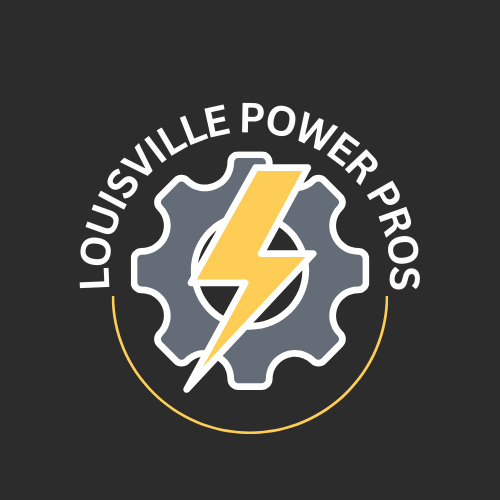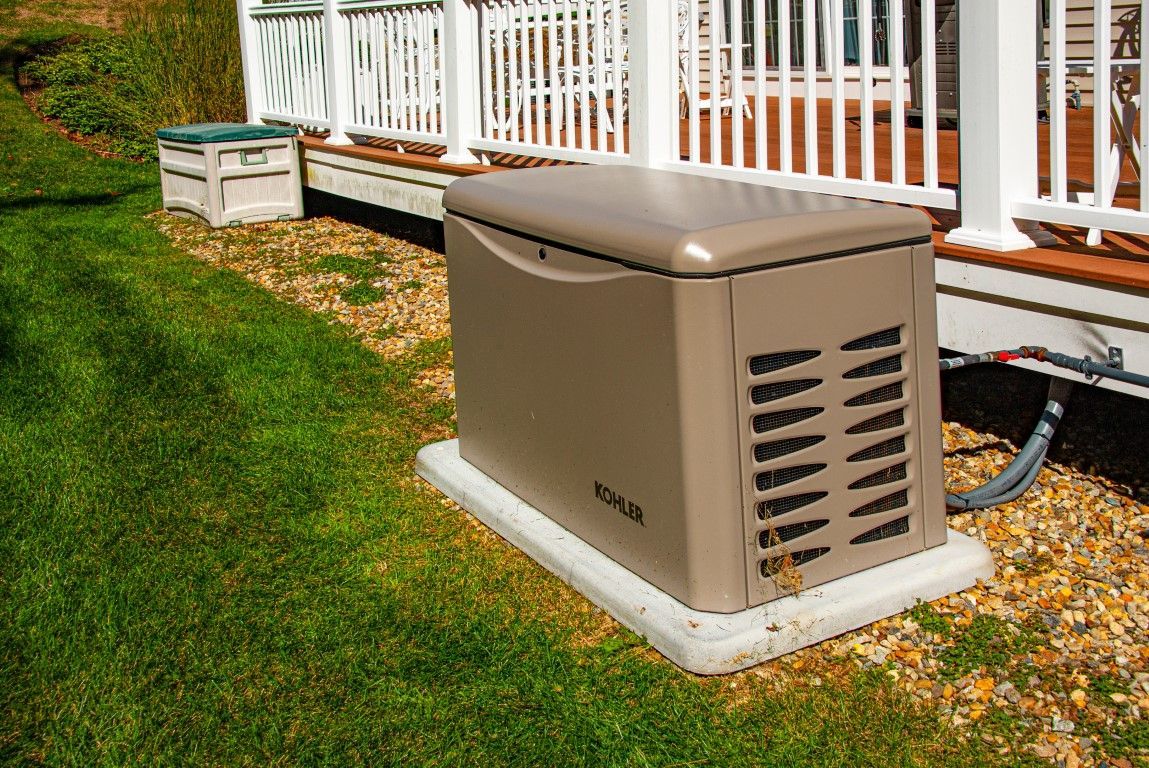
Residential Generators in Louisville KY
A residential generator is a backup power system designed to provide electricity to a home during power outages. These systems come in various types, each suited to different needs and preferences. The primary types include:
- Portable Generators: These are compact and can be moved around easily. They are ideal for temporary power needs or small-scale emergencies.
- Standby Generators: Permanently installed outside the home, these generators automatically kick in when the power goes out. They are suited for larger homes or those with critical power needs.
- Inverter Generators: Known for their quiet operation and fuel efficiency, inverter generators produce clean power suitable for sensitive electronics. They are often used for smaller homes or during less frequent outages.
Each type has its advantages depending on your specific requirements and how much power you need to sustain during an outage.
Key Features to Consider
When selecting a residential generator in Louisville, KY, several features should be taken into account to ensure it meets your needs.
- Power Output: Determine the wattage required to power essential appliances and systems in your home. Generators come in various sizes, so choose one that can handle your household's electrical load.
- Fuel Type: Generators run on different fuels, including gasoline, propane, and natural gas. Each has its own benefits and limitations, so consider the availability and cost of these fuels.
- Run Time: Look for a generator with a sufficient run time based on your expected usage. A longer run time means the generator can operate for extended periods without needing refueling.
- Noise Levels: Generators can be noisy, so choose one with lower noise levels if you are concerned about noise disrupting your home environment.

We will get back to you as soon as possible.
Please try again later.
Professional Installation
Proper installation is crucial for the safe and efficient operation of your generator. Professional installation ensures that the generator is set up according to local codes and safety standards. This includes correct placement, proper connection to your home's electrical system, and ensuring all safety measures are in place.
A licensed electrician or generator specialist should handle the installation to guarantee that the system is installed correctly and operates safely. They can also help with obtaining necessary permits and ensuring compliance with local regulations.
Routine Maintenance
To keep your generator in optimal condition, routine maintenance is essential. Regular maintenance includes:
- Checking and Changing the Oil: Regularly inspect and change the oil to keep the engine running smoothly.
- Inspecting the Air Filter: Clean or replace the air filter as needed to ensure efficient engine performance.
- Testing the Battery: Ensure the battery is in good condition and replace it if necessary.
- Running the Generator: Periodically run the generator to ensure it starts up and functions correctly during an outage.
Scheduled maintenance helps prevent unexpected breakdowns and extends the life of your generator.
When to Seek Professional Help
While routine maintenance can often be handled by homeowners, some situations require professional intervention. Seek professional help if:
- The Generator Fails to Start: If your generator doesn’t start or has trouble running, a technician can diagnose and fix the issue.
- Unusual Noises or Vibrations Occur: If you notice abnormal noises or vibrations, it could indicate a mechanical problem that needs expert attention.
- Electrical Issues Arise: Problems with the generator’s electrical connections or performance should be addressed by a professional to avoid safety hazards.
Cost Considerations
The cost of residential generators varies based on type, size, and features. Portable generators are generally less expensive than standby generators. In addition to the initial purchase price, consider installation costs, which can add to the overall expense.
Ongoing costs include fuel and routine maintenance. Evaluate your budget and long-term needs to choose a generator that offers the best balance of cost and functionality for your situation.
Long-Term Investment
Investing in a residential generator can be a wise decision for long-term peace of mind. A reliable generator ensures that you are prepared for power outages, providing comfort and security for your home. Over time, the cost of a generator is often outweighed by the convenience and safety it provides during emergencies.
If you are considering adding a residential generator to your home in Louisville, KY, contact us today to discuss your options. Our team can help you select the right generator for your needs, ensure professional installation, and provide ongoing maintenance support. Don’t wait for the next power outage—be prepared and secure your home with a reliable residential generator.
Eco-Friendly Options for Residential Generators
In a world increasingly focused on sustainability, finding eco-friendly solutions for everyday needs has become crucial. When it comes to residential generators, this shift is no different. Generators are essential for providing backup power during outages, but traditional models often rely on fossil fuels, which can be harmful to the environment. Fortunately, there are several eco-friendly options available that not only reduce your carbon footprint but also offer efficient and reliable performance. In this post, we’ll explore these options and explain why making the switch can benefit both you and the planet.

Solar-Powered Generators
Solar-powered generators are a leading eco-friendly option for residential power needs. These generators harness energy from the sun through solar panels, converting it into electricity to power your home. They are silent, produce no emissions, and are highly efficient for renewable energy production. Solar generators can be used as primary power sources or as backups during outages. They require minimal maintenance compared to traditional generators and can significantly reduce your reliance on fossil fuels.
Wind-Powered Generators
Wind-powered generators use wind turbines to generate electricity. These generators are ideal for locations with consistent wind patterns. The turbines convert wind energy into electrical power, which can then be used to run household appliances or stored for later use. While wind-powered generators may have a higher initial cost and installation complexity, they are a sustainable solution that contributes to reducing greenhouse gas emissions and reliance on non-renewable resources.
Biomass Generators
Biomass generators produce energy by burning organic materials such as wood chips, agricultural waste, or dedicated energy crops. These generators can be a more sustainable alternative to fossil fuels, as they utilize renewable resources and help reduce waste. Biomass generators are capable of providing consistent power and can be a viable option for those with access to biomass materials. They offer a lower environmental impact and can help manage local waste.
Hybrid Generators
Hybrid generators combine different power sources to maximize efficiency and reduce environmental impact. Typically, these units integrate solar power with traditional fuel sources like diesel or natural gas. The hybrid approach allows for a reduction in fuel consumption and emissions, as the generator can switch to solar power when conditions are favorable. This option provides flexibility and ensures reliable power supply while maintaining eco-friendly benefits.
Natural Gas Generators
Natural gas generators are another eco-friendly option, as natural gas burns cleaner than diesel or gasoline. They produce fewer pollutants and greenhouse gases, making them a more environmentally friendly choice. Natural gas generators are efficient and can be a practical solution for residential backup power. However, it is essential to ensure that the natural gas supply is reliable and consider the environmental impact of natural gas extraction and transportation.
Efficient and Low-Emission Models
For those who prefer conventional fuel sources but still want to make an eco-friendly choice, modern efficient and low-emission generator models are available. These generators are designed to minimize fuel consumption and emissions, incorporating advanced technologies to reduce their environmental impact. Investing in a high-efficiency model can lead to significant improvements in both performance and environmental footprint.
Making the switch to an eco-friendly generator is a step towards a more sustainable future. If you’re considering upgrading or installing a residential generator, we’re here to help. Our team can guide you through the best options for your needs and provide expert installation and support. Contact us today to learn more about how you can make your home power system greener and more efficient. Let’s work together to create a more sustainable and environmentally-friendly energy solution for your home.
How to Ensure Your Residential Generator Complies with Local Regulations
Owning a residential generator is a smart way to ensure that you have a reliable power source during outages or emergencies. However, it's essential to ensure that your generator complies with local regulations to avoid legal issues and ensure safety. Local regulations are designed to protect homeowners, their neighbors, and the environment. To make sure your residential generator adheres to local regulations, follow these key steps:
Research Local Codes and Regulations
Start by researching the specific codes and regulations applicable to generators in your area. Local governments often have zoning laws and codes that govern the installation and operation of generators. Check with your city or county's building department or municipal office to obtain the most current information. This research can help you understand what is required for your generator installation.
Obtain Necessary Permits
Obtain Necessary Permits
Many areas require permits for the installation of a residential generator. These permits ensure that your generator is installed according to safety standards and local regulations. Contact your local permitting office to find out what type of permit you need. In some cases, you may need to provide detailed plans or specifications for your generator installation.
Hire a Licensed Professional
Hire a Licensed Professional
Installing a generator involves technical expertise, and it's crucial to hire a licensed and experienced professional for the job. A licensed electrician or contractor will be familiar with local regulations and can ensure that your generator is installed correctly. They will also help with obtaining permits and ensuring that the installation meets all safety and code requirements.
Check for Noise Restrictions
Local regulations may include noise restrictions that affect the operation of your generator. Generators can produce significant noise, and some areas have specific limits on acceptable noise levels. Ensure that your generator complies with these restrictions by selecting a model that meets the noise level requirements or by installing soundproofing measures if necessary.
Ensure Proper Ventilation
Generators need adequate ventilation to operate safely and efficiently. Local regulations may specify requirements for ventilation to prevent the buildup of harmful exhaust gases. Make sure your generator installation includes proper ventilation, such as exhaust vents or enclosures that allow for the safe dispersal of exhaust fumes.
Follow Fuel Storage Guidelines
Fuel storage is another important aspect of compliance. Local regulations may dictate how fuel should be stored and handled to prevent environmental contamination and ensure safety. Follow these guidelines carefully and ensure that fuel storage containers are properly labeled and stored in accordance with local regulations.
Conduct Regular Maintenance
Compliance doesn't end with installation. Regular maintenance is essential to ensure your generator continues to operate safely and efficiently. Follow the manufacturer's maintenance schedule and keep records of all maintenance activities. Regular inspections can help identify potential issues before they become problems and ensure ongoing compliance with local regulations.
Review and Update Compliance
Regulations can change over time, so it's important to stay informed about any updates or changes to local codes that may affect your generator. Periodically review local regulations and update your generator installation or operation as needed to remain compliant.
Ensuring that your residential generator complies with local regulations is crucial for both safety and legal reasons. If you have any questions or need assistance with your generator installation or compliance, our team is here to help. Contact us today to speak with one of our experts who can provide guidance and support to ensure your generator meets all local requirements. We are committed to helping you achieve a safe and compliant generator setup.
Let's Connect!
For reliable whole-house generator services, trust
us. Our expert team offers turnkey installation, top-of-the-line Generac technology, and regular maintenance to keep your home powered during outages. Hire us for peace of mind and uninterrupted comfort when you need it most.